An Analysis of Leadership and Management Roles at TESCO
VerifiedAdded on 2021/02/20
|16
|4883
|30
Report
AI Summary
This report provides a comprehensive analysis of leadership and management practices within TESCO, a multinational retail company. It begins with an introduction to management and operations, emphasizing their role in achieving efficiency and profitability. The report then delves into the specific roles and characteristics of leaders and managers at TESCO, differentiating between leadership and management and examining their respective responsibilities. It explores leadership theories, such as transformational leadership and classical management theory, and their application within the company. Furthermore, the report examines how leadership and management roles are applied in various situations, including team building and project management, highlighting the importance of managers in resource allocation and strategic decision-making. The report concludes by emphasizing the significance of effective leadership and management in achieving organizational objectives and maintaining a competitive edge in the retail sector.
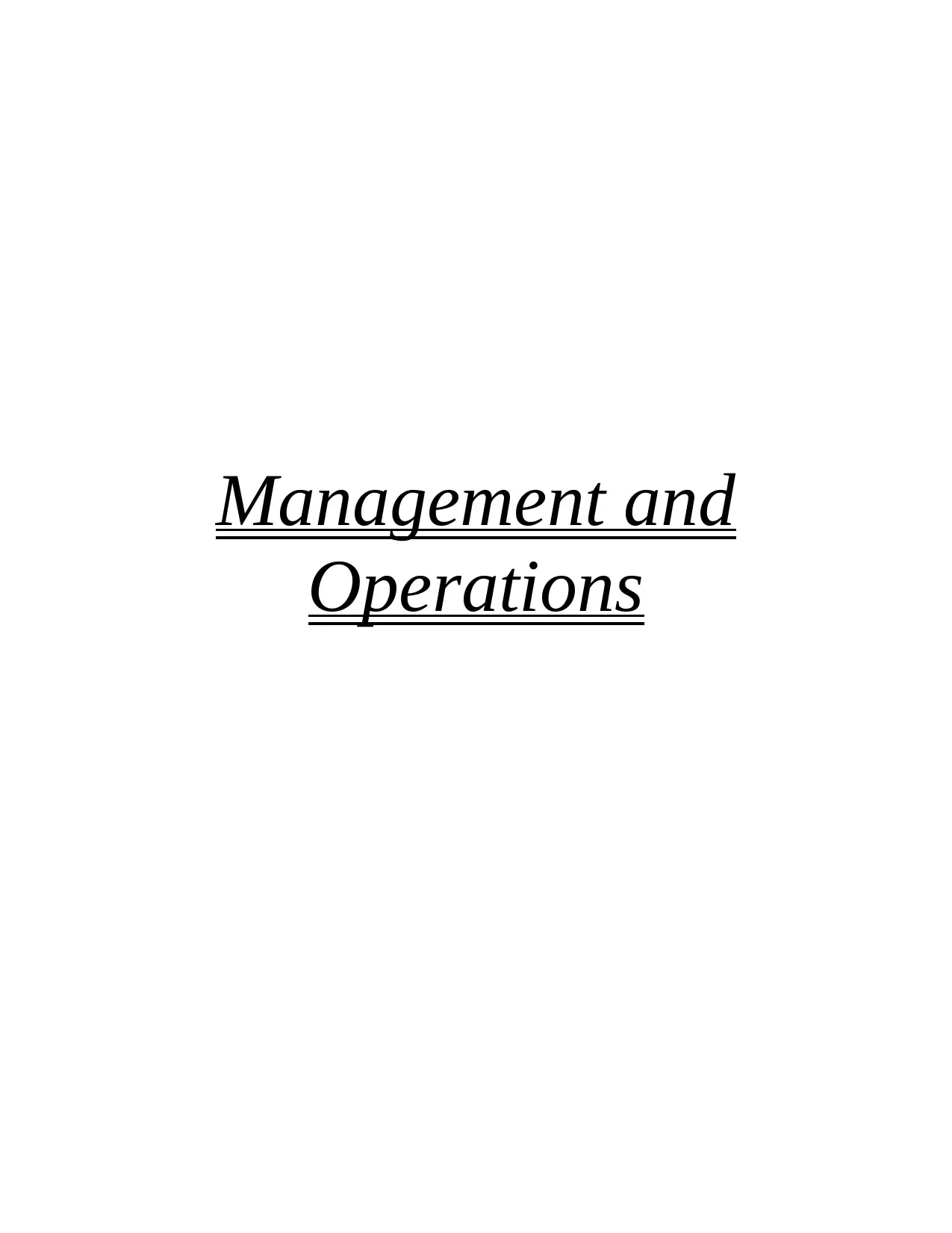
Management and
Operations
Operations
Paraphrase This Document
Need a fresh take? Get an instant paraphrase of this document with our AI Paraphraser
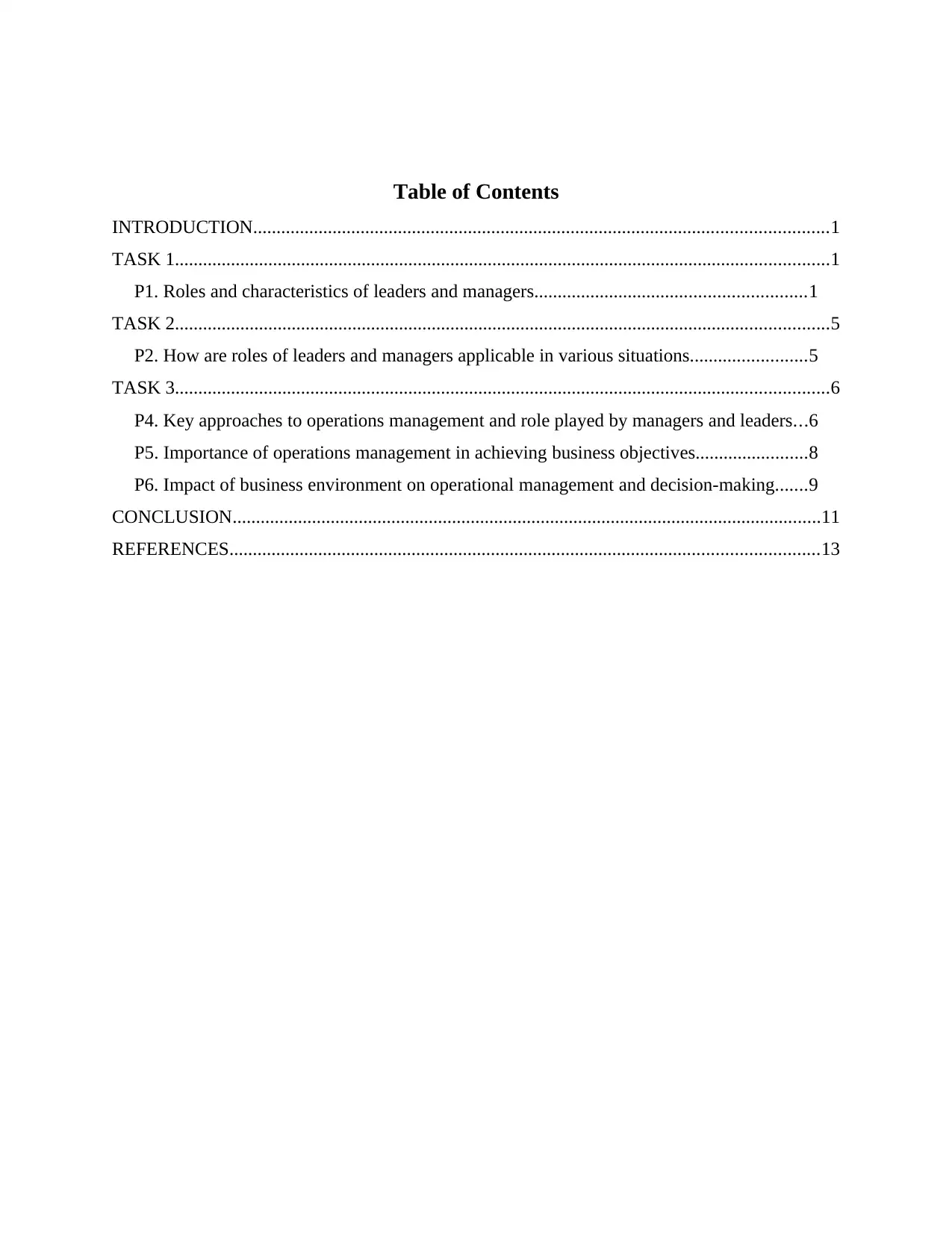
Table of Contents
INTRODUCTION...........................................................................................................................1
TASK 1............................................................................................................................................1
P1. Roles and characteristics of leaders and managers..........................................................1
TASK 2............................................................................................................................................5
P2. How are roles of leaders and managers applicable in various situations.........................5
TASK 3............................................................................................................................................6
P4. Key approaches to operations management and role played by managers and leaders...6
P5. Importance of operations management in achieving business objectives........................8
P6. Impact of business environment on operational management and decision-making.......9
CONCLUSION..............................................................................................................................11
REFERENCES..............................................................................................................................13
INTRODUCTION...........................................................................................................................1
TASK 1............................................................................................................................................1
P1. Roles and characteristics of leaders and managers..........................................................1
TASK 2............................................................................................................................................5
P2. How are roles of leaders and managers applicable in various situations.........................5
TASK 3............................................................................................................................................6
P4. Key approaches to operations management and role played by managers and leaders...6
P5. Importance of operations management in achieving business objectives........................8
P6. Impact of business environment on operational management and decision-making.......9
CONCLUSION..............................................................................................................................11
REFERENCES..............................................................................................................................13

⊘ This is a preview!⊘
Do you want full access?
Subscribe today to unlock all pages.

Trusted by 1+ million students worldwide
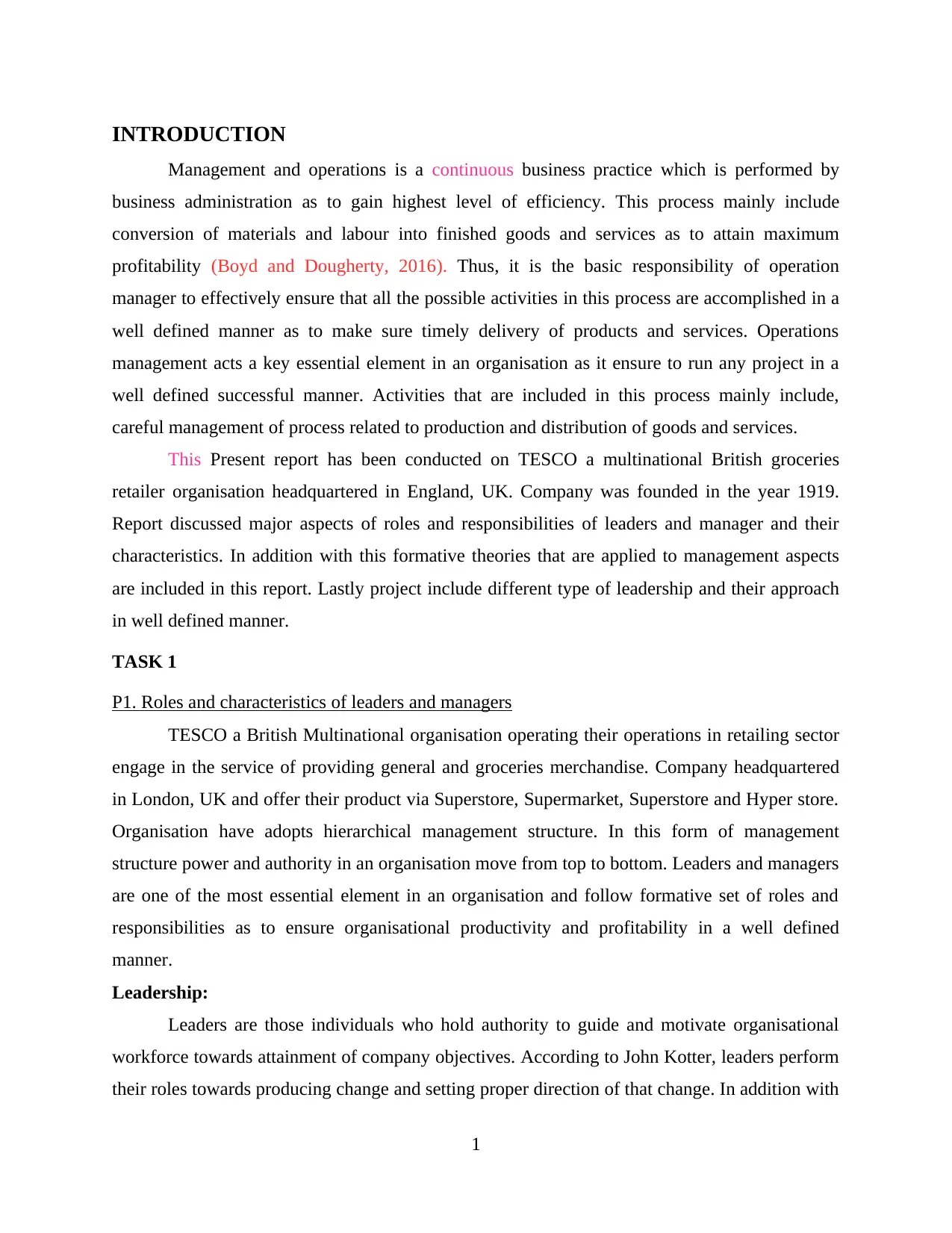
INTRODUCTION
Management and operations is a continuous business practice which is performed by
business administration as to gain highest level of efficiency. This process mainly include
conversion of materials and labour into finished goods and services as to attain maximum
profitability (Boyd and Dougherty, 2016). Thus, it is the basic responsibility of operation
manager to effectively ensure that all the possible activities in this process are accomplished in a
well defined manner as to make sure timely delivery of products and services. Operations
management acts a key essential element in an organisation as it ensure to run any project in a
well defined successful manner. Activities that are included in this process mainly include,
careful management of process related to production and distribution of goods and services.
This Present report has been conducted on TESCO a multinational British groceries
retailer organisation headquartered in England, UK. Company was founded in the year 1919.
Report discussed major aspects of roles and responsibilities of leaders and manager and their
characteristics. In addition with this formative theories that are applied to management aspects
are included in this report. Lastly project include different type of leadership and their approach
in well defined manner.
TASK 1
P1. Roles and characteristics of leaders and managers
TESCO a British Multinational organisation operating their operations in retailing sector
engage in the service of providing general and groceries merchandise. Company headquartered
in London, UK and offer their product via Superstore, Supermarket, Superstore and Hyper store.
Organisation have adopts hierarchical management structure. In this form of management
structure power and authority in an organisation move from top to bottom. Leaders and managers
are one of the most essential element in an organisation and follow formative set of roles and
responsibilities as to ensure organisational productivity and profitability in a well defined
manner.
Leadership:
Leaders are those individuals who hold authority to guide and motivate organisational
workforce towards attainment of company objectives. According to John Kotter, leaders perform
their roles towards producing change and setting proper direction of that change. In addition with
1
Management and operations is a continuous business practice which is performed by
business administration as to gain highest level of efficiency. This process mainly include
conversion of materials and labour into finished goods and services as to attain maximum
profitability (Boyd and Dougherty, 2016). Thus, it is the basic responsibility of operation
manager to effectively ensure that all the possible activities in this process are accomplished in a
well defined manner as to make sure timely delivery of products and services. Operations
management acts a key essential element in an organisation as it ensure to run any project in a
well defined successful manner. Activities that are included in this process mainly include,
careful management of process related to production and distribution of goods and services.
This Present report has been conducted on TESCO a multinational British groceries
retailer organisation headquartered in England, UK. Company was founded in the year 1919.
Report discussed major aspects of roles and responsibilities of leaders and manager and their
characteristics. In addition with this formative theories that are applied to management aspects
are included in this report. Lastly project include different type of leadership and their approach
in well defined manner.
TASK 1
P1. Roles and characteristics of leaders and managers
TESCO a British Multinational organisation operating their operations in retailing sector
engage in the service of providing general and groceries merchandise. Company headquartered
in London, UK and offer their product via Superstore, Supermarket, Superstore and Hyper store.
Organisation have adopts hierarchical management structure. In this form of management
structure power and authority in an organisation move from top to bottom. Leaders and managers
are one of the most essential element in an organisation and follow formative set of roles and
responsibilities as to ensure organisational productivity and profitability in a well defined
manner.
Leadership:
Leaders are those individuals who hold authority to guide and motivate organisational
workforce towards attainment of company objectives. According to John Kotter, leaders perform
their roles towards producing change and setting proper direction of that change. In addition with
1
Paraphrase This Document
Need a fresh take? Get an instant paraphrase of this document with our AI Paraphraser
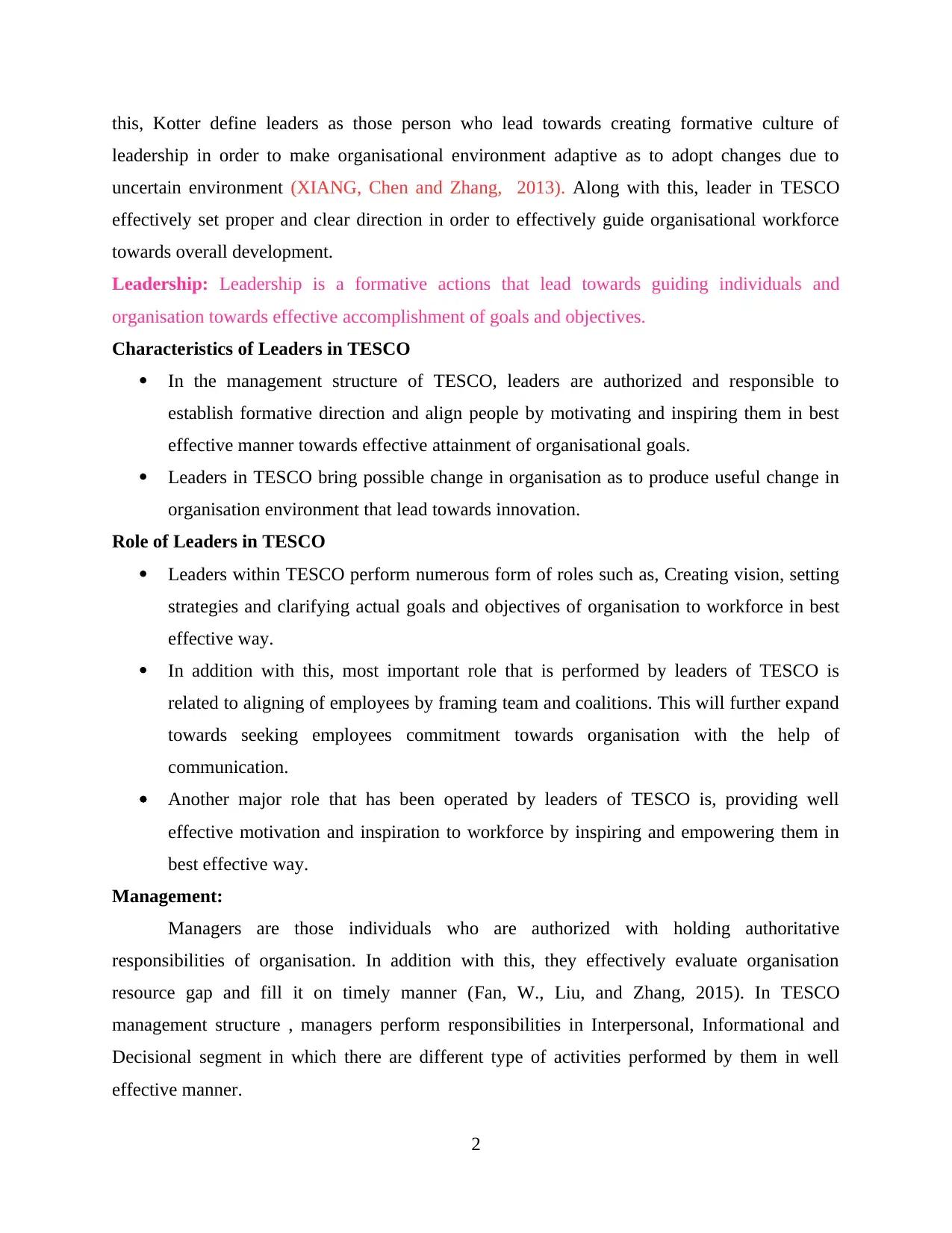
this, Kotter define leaders as those person who lead towards creating formative culture of
leadership in order to make organisational environment adaptive as to adopt changes due to
uncertain environment (XIANG, Chen and Zhang, 2013). Along with this, leader in TESCO
effectively set proper and clear direction in order to effectively guide organisational workforce
towards overall development.
Leadership: Leadership is a formative actions that lead towards guiding individuals and
organisation towards effective accomplishment of goals and objectives.
Characteristics of Leaders in TESCO
In the management structure of TESCO, leaders are authorized and responsible to
establish formative direction and align people by motivating and inspiring them in best
effective manner towards effective attainment of organisational goals.
Leaders in TESCO bring possible change in organisation as to produce useful change in
organisation environment that lead towards innovation.
Role of Leaders in TESCO
Leaders within TESCO perform numerous form of roles such as, Creating vision, setting
strategies and clarifying actual goals and objectives of organisation to workforce in best
effective way.
In addition with this, most important role that is performed by leaders of TESCO is
related to aligning of employees by framing team and coalitions. This will further expand
towards seeking employees commitment towards organisation with the help of
communication.
Another major role that has been operated by leaders of TESCO is, providing well
effective motivation and inspiration to workforce by inspiring and empowering them in
best effective way.
Management:
Managers are those individuals who are authorized with holding authoritative
responsibilities of organisation. In addition with this, they effectively evaluate organisation
resource gap and fill it on timely manner (Fan, W., Liu, and Zhang, 2015). In TESCO
management structure , managers perform responsibilities in Interpersonal, Informational and
Decisional segment in which there are different type of activities performed by them in well
effective manner.
2
leadership in order to make organisational environment adaptive as to adopt changes due to
uncertain environment (XIANG, Chen and Zhang, 2013). Along with this, leader in TESCO
effectively set proper and clear direction in order to effectively guide organisational workforce
towards overall development.
Leadership: Leadership is a formative actions that lead towards guiding individuals and
organisation towards effective accomplishment of goals and objectives.
Characteristics of Leaders in TESCO
In the management structure of TESCO, leaders are authorized and responsible to
establish formative direction and align people by motivating and inspiring them in best
effective manner towards effective attainment of organisational goals.
Leaders in TESCO bring possible change in organisation as to produce useful change in
organisation environment that lead towards innovation.
Role of Leaders in TESCO
Leaders within TESCO perform numerous form of roles such as, Creating vision, setting
strategies and clarifying actual goals and objectives of organisation to workforce in best
effective way.
In addition with this, most important role that is performed by leaders of TESCO is
related to aligning of employees by framing team and coalitions. This will further expand
towards seeking employees commitment towards organisation with the help of
communication.
Another major role that has been operated by leaders of TESCO is, providing well
effective motivation and inspiration to workforce by inspiring and empowering them in
best effective way.
Management:
Managers are those individuals who are authorized with holding authoritative
responsibilities of organisation. In addition with this, they effectively evaluate organisation
resource gap and fill it on timely manner (Fan, W., Liu, and Zhang, 2015). In TESCO
management structure , managers perform responsibilities in Interpersonal, Informational and
Decisional segment in which there are different type of activities performed by them in well
effective manner.
2
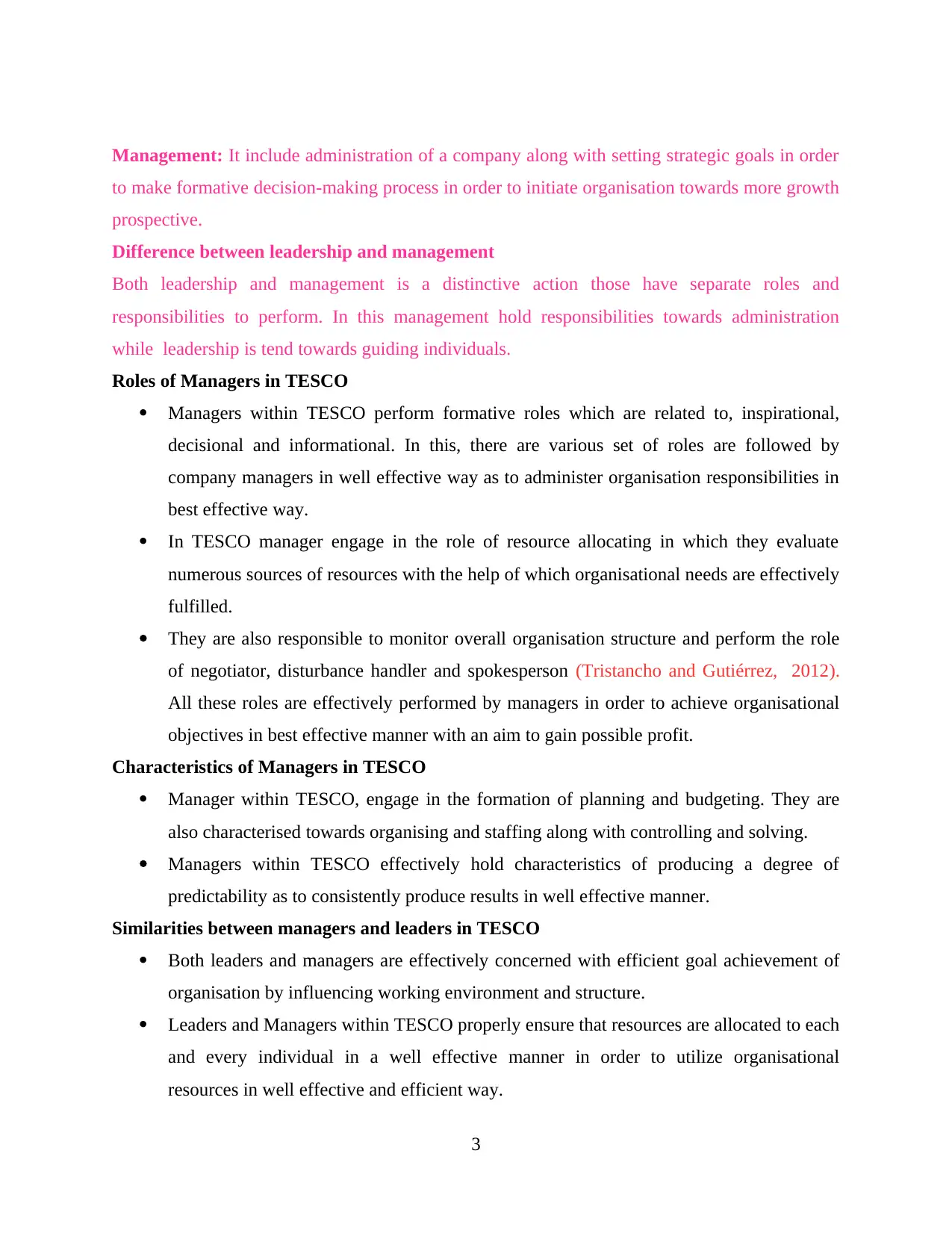
Management: It include administration of a company along with setting strategic goals in order
to make formative decision-making process in order to initiate organisation towards more growth
prospective.
Difference between leadership and management
Both leadership and management is a distinctive action those have separate roles and
responsibilities to perform. In this management hold responsibilities towards administration
while leadership is tend towards guiding individuals.
Roles of Managers in TESCO
Managers within TESCO perform formative roles which are related to, inspirational,
decisional and informational. In this, there are various set of roles are followed by
company managers in well effective way as to administer organisation responsibilities in
best effective way.
In TESCO manager engage in the role of resource allocating in which they evaluate
numerous sources of resources with the help of which organisational needs are effectively
fulfilled.
They are also responsible to monitor overall organisation structure and perform the role
of negotiator, disturbance handler and spokesperson (Tristancho and Gutiérrez, 2012).
All these roles are effectively performed by managers in order to achieve organisational
objectives in best effective manner with an aim to gain possible profit.
Characteristics of Managers in TESCO
Manager within TESCO, engage in the formation of planning and budgeting. They are
also characterised towards organising and staffing along with controlling and solving.
Managers within TESCO effectively hold characteristics of producing a degree of
predictability as to consistently produce results in well effective manner.
Similarities between managers and leaders in TESCO
Both leaders and managers are effectively concerned with efficient goal achievement of
organisation by influencing working environment and structure.
Leaders and Managers within TESCO properly ensure that resources are allocated to each
and every individual in a well effective manner in order to utilize organisational
resources in well effective and efficient way.
3
to make formative decision-making process in order to initiate organisation towards more growth
prospective.
Difference between leadership and management
Both leadership and management is a distinctive action those have separate roles and
responsibilities to perform. In this management hold responsibilities towards administration
while leadership is tend towards guiding individuals.
Roles of Managers in TESCO
Managers within TESCO perform formative roles which are related to, inspirational,
decisional and informational. In this, there are various set of roles are followed by
company managers in well effective way as to administer organisation responsibilities in
best effective way.
In TESCO manager engage in the role of resource allocating in which they evaluate
numerous sources of resources with the help of which organisational needs are effectively
fulfilled.
They are also responsible to monitor overall organisation structure and perform the role
of negotiator, disturbance handler and spokesperson (Tristancho and Gutiérrez, 2012).
All these roles are effectively performed by managers in order to achieve organisational
objectives in best effective manner with an aim to gain possible profit.
Characteristics of Managers in TESCO
Manager within TESCO, engage in the formation of planning and budgeting. They are
also characterised towards organising and staffing along with controlling and solving.
Managers within TESCO effectively hold characteristics of producing a degree of
predictability as to consistently produce results in well effective manner.
Similarities between managers and leaders in TESCO
Both leaders and managers are effectively concerned with efficient goal achievement of
organisation by influencing working environment and structure.
Leaders and Managers within TESCO properly ensure that resources are allocated to each
and every individual in a well effective manner in order to utilize organisational
resources in well effective and efficient way.
3
⊘ This is a preview!⊘
Do you want full access?
Subscribe today to unlock all pages.

Trusted by 1+ million students worldwide
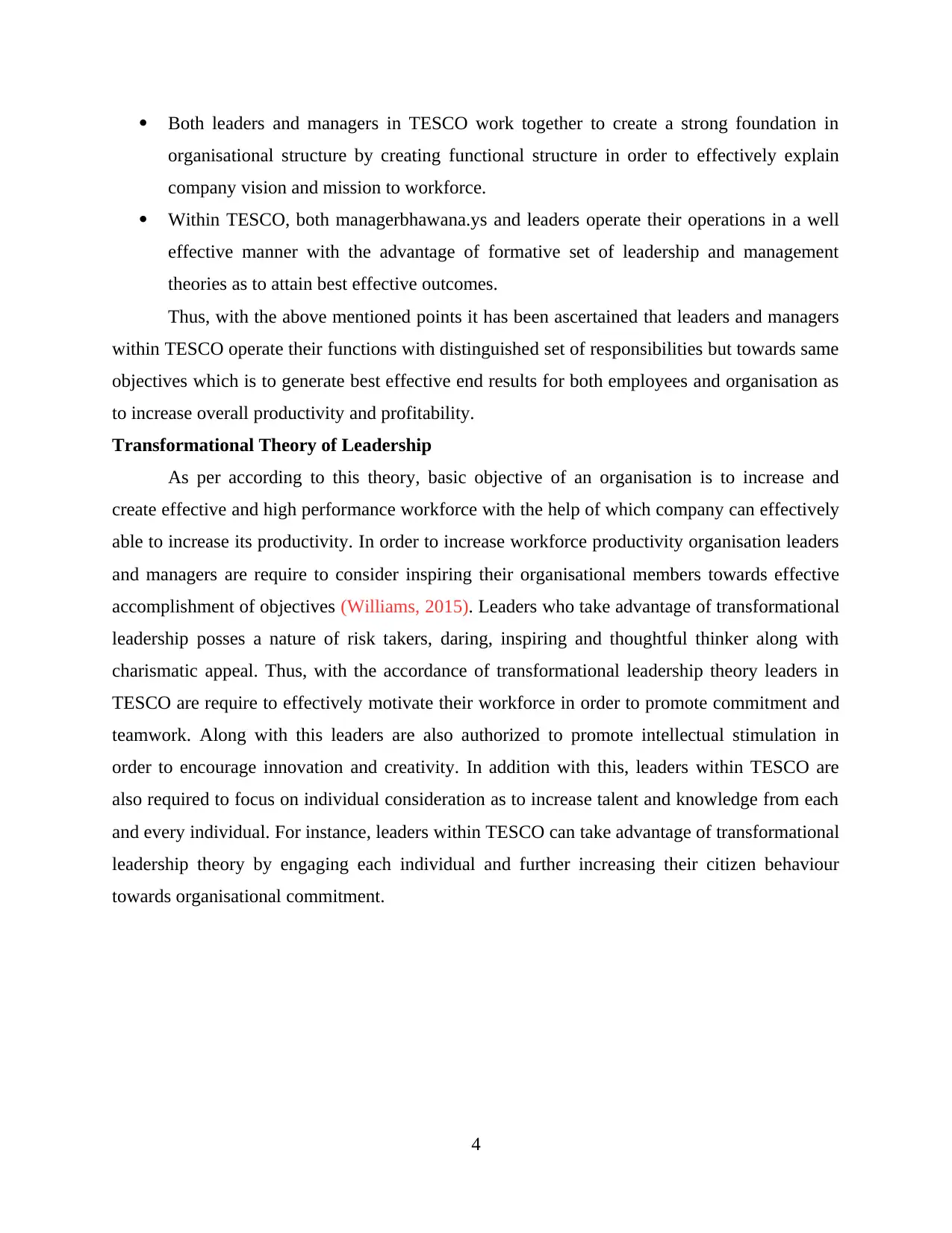
Both leaders and managers in TESCO work together to create a strong foundation in
organisational structure by creating functional structure in order to effectively explain
company vision and mission to workforce.
Within TESCO, both managerbhawana.ys and leaders operate their operations in a well
effective manner with the advantage of formative set of leadership and management
theories as to attain best effective outcomes.
Thus, with the above mentioned points it has been ascertained that leaders and managers
within TESCO operate their functions with distinguished set of responsibilities but towards same
objectives which is to generate best effective end results for both employees and organisation as
to increase overall productivity and profitability.
Transformational Theory of Leadership
As per according to this theory, basic objective of an organisation is to increase and
create effective and high performance workforce with the help of which company can effectively
able to increase its productivity. In order to increase workforce productivity organisation leaders
and managers are require to consider inspiring their organisational members towards effective
accomplishment of objectives (Williams, 2015). Leaders who take advantage of transformational
leadership posses a nature of risk takers, daring, inspiring and thoughtful thinker along with
charismatic appeal. Thus, with the accordance of transformational leadership theory leaders in
TESCO are require to effectively motivate their workforce in order to promote commitment and
teamwork. Along with this leaders are also authorized to promote intellectual stimulation in
order to encourage innovation and creativity. In addition with this, leaders within TESCO are
also required to focus on individual consideration as to increase talent and knowledge from each
and every individual. For instance, leaders within TESCO can take advantage of transformational
leadership theory by engaging each individual and further increasing their citizen behaviour
towards organisational commitment.
4
organisational structure by creating functional structure in order to effectively explain
company vision and mission to workforce.
Within TESCO, both managerbhawana.ys and leaders operate their operations in a well
effective manner with the advantage of formative set of leadership and management
theories as to attain best effective outcomes.
Thus, with the above mentioned points it has been ascertained that leaders and managers
within TESCO operate their functions with distinguished set of responsibilities but towards same
objectives which is to generate best effective end results for both employees and organisation as
to increase overall productivity and profitability.
Transformational Theory of Leadership
As per according to this theory, basic objective of an organisation is to increase and
create effective and high performance workforce with the help of which company can effectively
able to increase its productivity. In order to increase workforce productivity organisation leaders
and managers are require to consider inspiring their organisational members towards effective
accomplishment of objectives (Williams, 2015). Leaders who take advantage of transformational
leadership posses a nature of risk takers, daring, inspiring and thoughtful thinker along with
charismatic appeal. Thus, with the accordance of transformational leadership theory leaders in
TESCO are require to effectively motivate their workforce in order to promote commitment and
teamwork. Along with this leaders are also authorized to promote intellectual stimulation in
order to encourage innovation and creativity. In addition with this, leaders within TESCO are
also required to focus on individual consideration as to increase talent and knowledge from each
and every individual. For instance, leaders within TESCO can take advantage of transformational
leadership theory by engaging each individual and further increasing their citizen behaviour
towards organisational commitment.
4
Paraphrase This Document
Need a fresh take? Get an instant paraphrase of this document with our AI Paraphraser
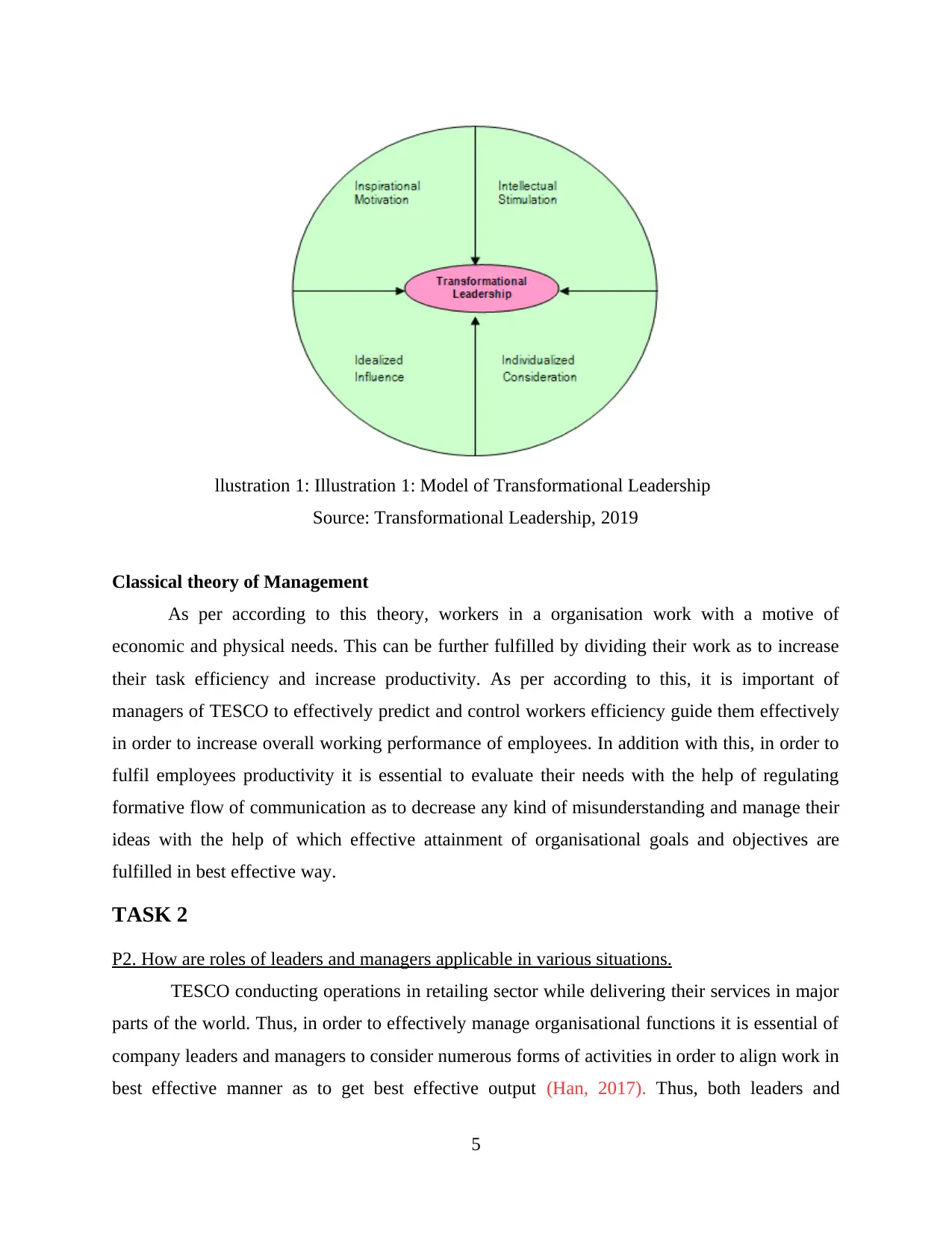
llustration 1: Illustration 1: Model of Transformational Leadership
Source: Transformational Leadership, 2019
Classical theory of Management
As per according to this theory, workers in a organisation work with a motive of
economic and physical needs. This can be further fulfilled by dividing their work as to increase
their task efficiency and increase productivity. As per according to this, it is important of
managers of TESCO to effectively predict and control workers efficiency guide them effectively
in order to increase overall working performance of employees. In addition with this, in order to
fulfil employees productivity it is essential to evaluate their needs with the help of regulating
formative flow of communication as to decrease any kind of misunderstanding and manage their
ideas with the help of which effective attainment of organisational goals and objectives are
fulfilled in best effective way.
TASK 2
P2. How are roles of leaders and managers applicable in various situations.
TESCO conducting operations in retailing sector while delivering their services in major
parts of the world. Thus, in order to effectively manage organisational functions it is essential of
company leaders and managers to consider numerous forms of activities in order to align work in
best effective manner as to get best effective output (Han, 2017). Thus, both leaders and
5
Source: Transformational Leadership, 2019
Classical theory of Management
As per according to this theory, workers in a organisation work with a motive of
economic and physical needs. This can be further fulfilled by dividing their work as to increase
their task efficiency and increase productivity. As per according to this, it is important of
managers of TESCO to effectively predict and control workers efficiency guide them effectively
in order to increase overall working performance of employees. In addition with this, in order to
fulfil employees productivity it is essential to evaluate their needs with the help of regulating
formative flow of communication as to decrease any kind of misunderstanding and manage their
ideas with the help of which effective attainment of organisational goals and objectives are
fulfilled in best effective way.
TASK 2
P2. How are roles of leaders and managers applicable in various situations.
TESCO conducting operations in retailing sector while delivering their services in major
parts of the world. Thus, in order to effectively manage organisational functions it is essential of
company leaders and managers to consider numerous forms of activities in order to align work in
best effective manner as to get best effective output (Han, 2017). Thus, both leaders and
5
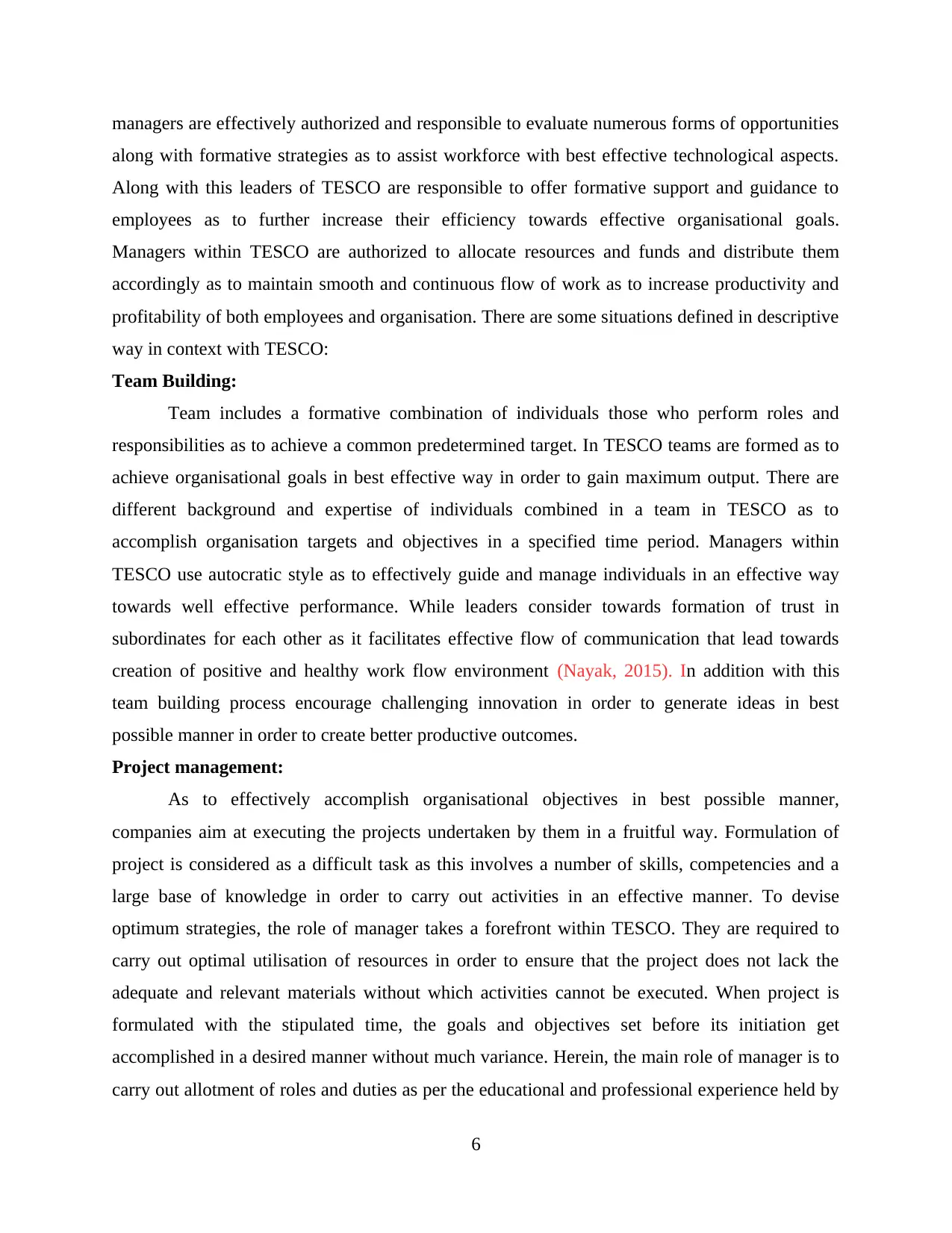
managers are effectively authorized and responsible to evaluate numerous forms of opportunities
along with formative strategies as to assist workforce with best effective technological aspects.
Along with this leaders of TESCO are responsible to offer formative support and guidance to
employees as to further increase their efficiency towards effective organisational goals.
Managers within TESCO are authorized to allocate resources and funds and distribute them
accordingly as to maintain smooth and continuous flow of work as to increase productivity and
profitability of both employees and organisation. There are some situations defined in descriptive
way in context with TESCO:
Team Building:
Team includes a formative combination of individuals those who perform roles and
responsibilities as to achieve a common predetermined target. In TESCO teams are formed as to
achieve organisational goals in best effective way in order to gain maximum output. There are
different background and expertise of individuals combined in a team in TESCO as to
accomplish organisation targets and objectives in a specified time period. Managers within
TESCO use autocratic style as to effectively guide and manage individuals in an effective way
towards well effective performance. While leaders consider towards formation of trust in
subordinates for each other as it facilitates effective flow of communication that lead towards
creation of positive and healthy work flow environment (Nayak, 2015). In addition with this
team building process encourage challenging innovation in order to generate ideas in best
possible manner in order to create better productive outcomes.
Project management:
As to effectively accomplish organisational objectives in best possible manner,
companies aim at executing the projects undertaken by them in a fruitful way. Formulation of
project is considered as a difficult task as this involves a number of skills, competencies and a
large base of knowledge in order to carry out activities in an effective manner. To devise
optimum strategies, the role of manager takes a forefront within TESCO. They are required to
carry out optimal utilisation of resources in order to ensure that the project does not lack the
adequate and relevant materials without which activities cannot be executed. When project is
formulated with the stipulated time, the goals and objectives set before its initiation get
accomplished in a desired manner without much variance. Herein, the main role of manager is to
carry out allotment of roles and duties as per the educational and professional experience held by
6
along with formative strategies as to assist workforce with best effective technological aspects.
Along with this leaders of TESCO are responsible to offer formative support and guidance to
employees as to further increase their efficiency towards effective organisational goals.
Managers within TESCO are authorized to allocate resources and funds and distribute them
accordingly as to maintain smooth and continuous flow of work as to increase productivity and
profitability of both employees and organisation. There are some situations defined in descriptive
way in context with TESCO:
Team Building:
Team includes a formative combination of individuals those who perform roles and
responsibilities as to achieve a common predetermined target. In TESCO teams are formed as to
achieve organisational goals in best effective way in order to gain maximum output. There are
different background and expertise of individuals combined in a team in TESCO as to
accomplish organisation targets and objectives in a specified time period. Managers within
TESCO use autocratic style as to effectively guide and manage individuals in an effective way
towards well effective performance. While leaders consider towards formation of trust in
subordinates for each other as it facilitates effective flow of communication that lead towards
creation of positive and healthy work flow environment (Nayak, 2015). In addition with this
team building process encourage challenging innovation in order to generate ideas in best
possible manner in order to create better productive outcomes.
Project management:
As to effectively accomplish organisational objectives in best possible manner,
companies aim at executing the projects undertaken by them in a fruitful way. Formulation of
project is considered as a difficult task as this involves a number of skills, competencies and a
large base of knowledge in order to carry out activities in an effective manner. To devise
optimum strategies, the role of manager takes a forefront within TESCO. They are required to
carry out optimal utilisation of resources in order to ensure that the project does not lack the
adequate and relevant materials without which activities cannot be executed. When project is
formulated with the stipulated time, the goals and objectives set before its initiation get
accomplished in a desired manner without much variance. Herein, the main role of manager is to
carry out allotment of roles and duties as per the educational and professional experience held by
6
⊘ This is a preview!⊘
Do you want full access?
Subscribe today to unlock all pages.

Trusted by 1+ million students worldwide
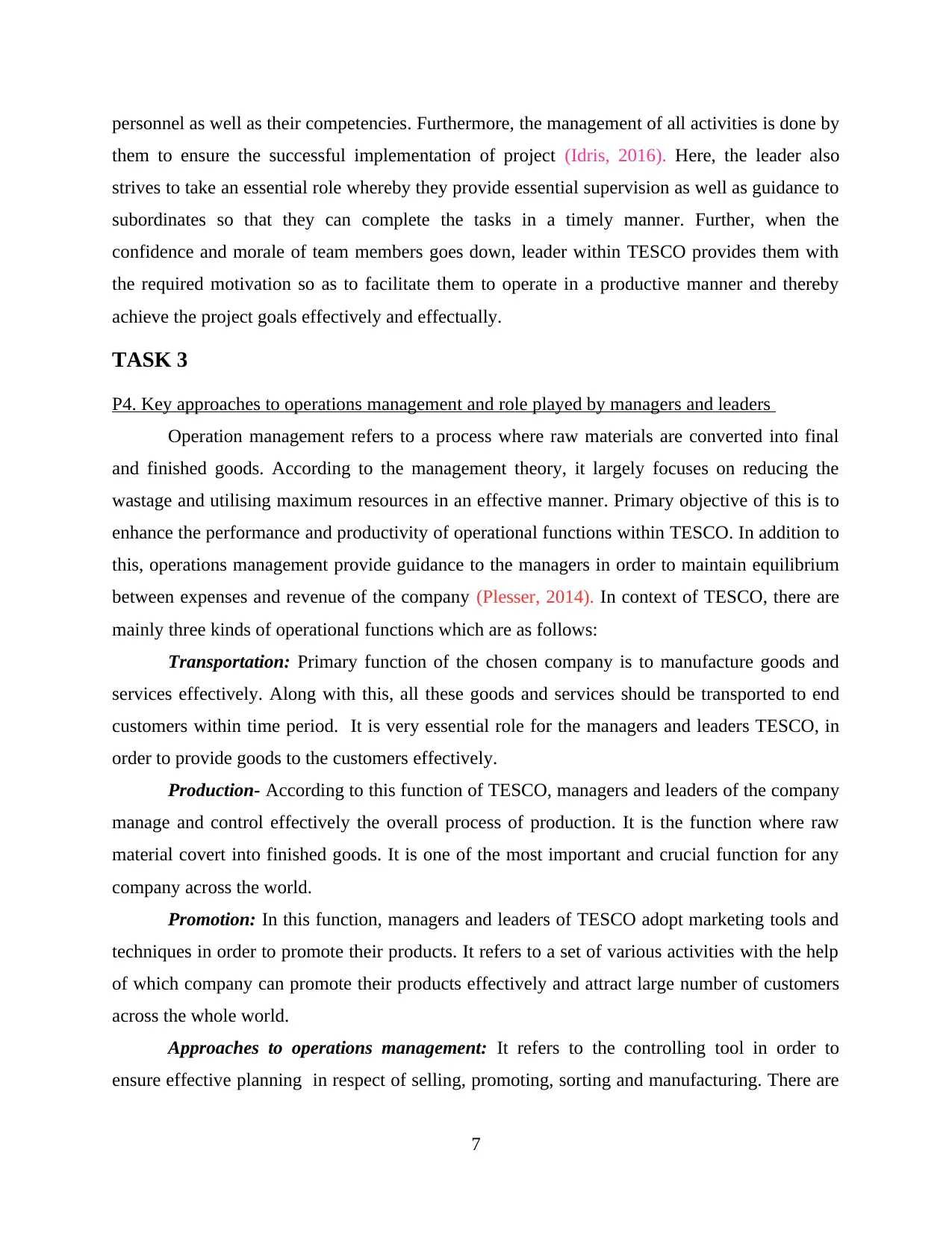
personnel as well as their competencies. Furthermore, the management of all activities is done by
them to ensure the successful implementation of project (Idris, 2016). Here, the leader also
strives to take an essential role whereby they provide essential supervision as well as guidance to
subordinates so that they can complete the tasks in a timely manner. Further, when the
confidence and morale of team members goes down, leader within TESCO provides them with
the required motivation so as to facilitate them to operate in a productive manner and thereby
achieve the project goals effectively and effectually.
TASK 3
P4. Key approaches to operations management and role played by managers and leaders
Operation management refers to a process where raw materials are converted into final
and finished goods. According to the management theory, it largely focuses on reducing the
wastage and utilising maximum resources in an effective manner. Primary objective of this is to
enhance the performance and productivity of operational functions within TESCO. In addition to
this, operations management provide guidance to the managers in order to maintain equilibrium
between expenses and revenue of the company (Plesser, 2014). In context of TESCO, there are
mainly three kinds of operational functions which are as follows:
Transportation: Primary function of the chosen company is to manufacture goods and
services effectively. Along with this, all these goods and services should be transported to end
customers within time period. It is very essential role for the managers and leaders TESCO, in
order to provide goods to the customers effectively.
Production- According to this function of TESCO, managers and leaders of the company
manage and control effectively the overall process of production. It is the function where raw
material covert into finished goods. It is one of the most important and crucial function for any
company across the world.
Promotion: In this function, managers and leaders of TESCO adopt marketing tools and
techniques in order to promote their products. It refers to a set of various activities with the help
of which company can promote their products effectively and attract large number of customers
across the whole world.
Approaches to operations management: It refers to the controlling tool in order to
ensure effective planning in respect of selling, promoting, sorting and manufacturing. There are
7
them to ensure the successful implementation of project (Idris, 2016). Here, the leader also
strives to take an essential role whereby they provide essential supervision as well as guidance to
subordinates so that they can complete the tasks in a timely manner. Further, when the
confidence and morale of team members goes down, leader within TESCO provides them with
the required motivation so as to facilitate them to operate in a productive manner and thereby
achieve the project goals effectively and effectually.
TASK 3
P4. Key approaches to operations management and role played by managers and leaders
Operation management refers to a process where raw materials are converted into final
and finished goods. According to the management theory, it largely focuses on reducing the
wastage and utilising maximum resources in an effective manner. Primary objective of this is to
enhance the performance and productivity of operational functions within TESCO. In addition to
this, operations management provide guidance to the managers in order to maintain equilibrium
between expenses and revenue of the company (Plesser, 2014). In context of TESCO, there are
mainly three kinds of operational functions which are as follows:
Transportation: Primary function of the chosen company is to manufacture goods and
services effectively. Along with this, all these goods and services should be transported to end
customers within time period. It is very essential role for the managers and leaders TESCO, in
order to provide goods to the customers effectively.
Production- According to this function of TESCO, managers and leaders of the company
manage and control effectively the overall process of production. It is the function where raw
material covert into finished goods. It is one of the most important and crucial function for any
company across the world.
Promotion: In this function, managers and leaders of TESCO adopt marketing tools and
techniques in order to promote their products. It refers to a set of various activities with the help
of which company can promote their products effectively and attract large number of customers
across the whole world.
Approaches to operations management: It refers to the controlling tool in order to
ensure effective planning in respect of selling, promoting, sorting and manufacturing. There are
7
Paraphrase This Document
Need a fresh take? Get an instant paraphrase of this document with our AI Paraphraser
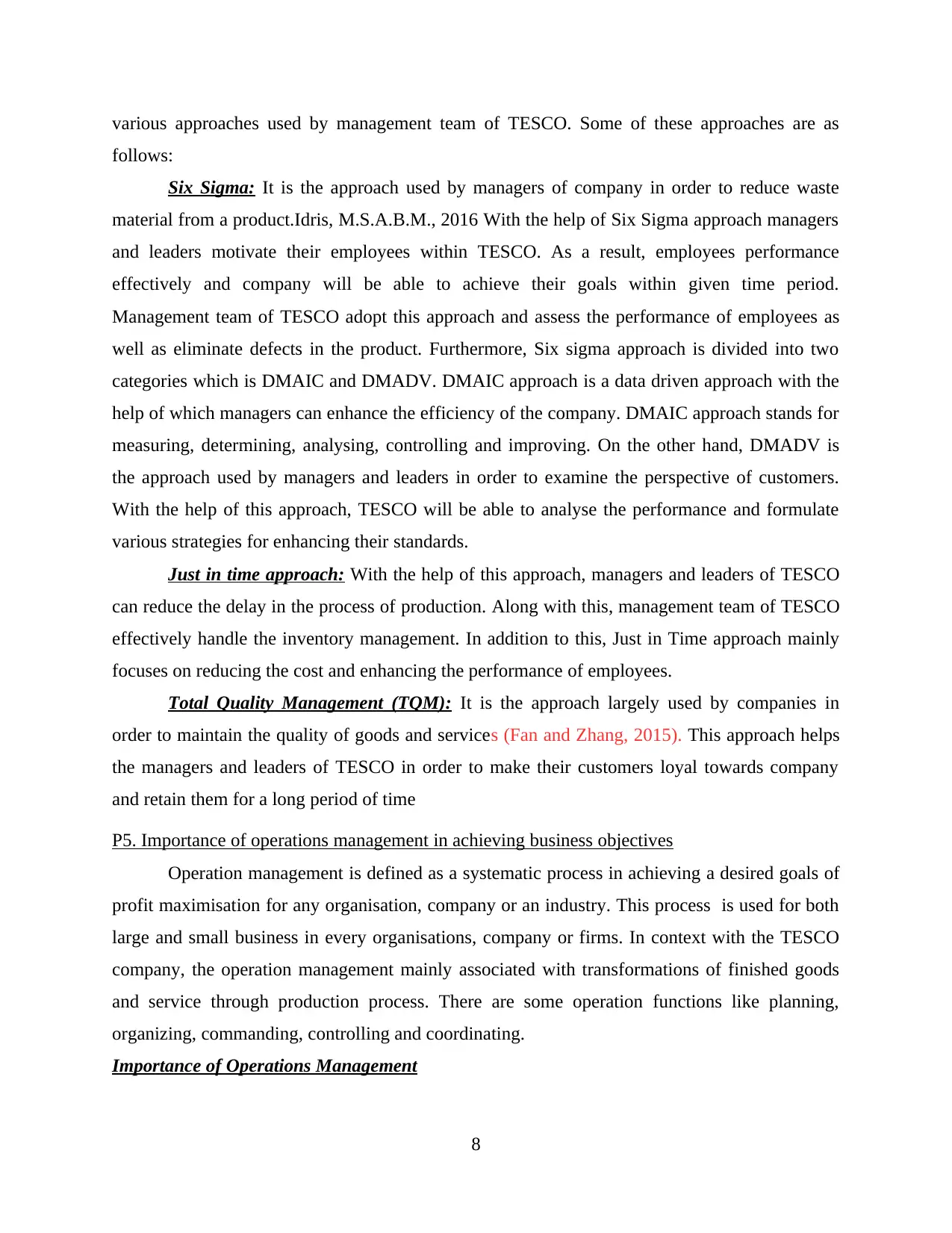
various approaches used by management team of TESCO. Some of these approaches are as
follows:
Six Sigma: It is the approach used by managers of company in order to reduce waste
material from a product.Idris, M.S.A.B.M., 2016 With the help of Six Sigma approach managers
and leaders motivate their employees within TESCO. As a result, employees performance
effectively and company will be able to achieve their goals within given time period.
Management team of TESCO adopt this approach and assess the performance of employees as
well as eliminate defects in the product. Furthermore, Six sigma approach is divided into two
categories which is DMAIC and DMADV. DMAIC approach is a data driven approach with the
help of which managers can enhance the efficiency of the company. DMAIC approach stands for
measuring, determining, analysing, controlling and improving. On the other hand, DMADV is
the approach used by managers and leaders in order to examine the perspective of customers.
With the help of this approach, TESCO will be able to analyse the performance and formulate
various strategies for enhancing their standards.
Just in time approach: With the help of this approach, managers and leaders of TESCO
can reduce the delay in the process of production. Along with this, management team of TESCO
effectively handle the inventory management. In addition to this, Just in Time approach mainly
focuses on reducing the cost and enhancing the performance of employees.
Total Quality Management (TQM): It is the approach largely used by companies in
order to maintain the quality of goods and services (Fan and Zhang, 2015). This approach helps
the managers and leaders of TESCO in order to make their customers loyal towards company
and retain them for a long period of time
P5. Importance of operations management in achieving business objectives
Operation management is defined as a systematic process in achieving a desired goals of
profit maximisation for any organisation, company or an industry. This process is used for both
large and small business in every organisations, company or firms. In context with the TESCO
company, the operation management mainly associated with transformations of finished goods
and service through production process. There are some operation functions like planning,
organizing, commanding, controlling and coordinating.
Importance of Operations Management
8
follows:
Six Sigma: It is the approach used by managers of company in order to reduce waste
material from a product.Idris, M.S.A.B.M., 2016 With the help of Six Sigma approach managers
and leaders motivate their employees within TESCO. As a result, employees performance
effectively and company will be able to achieve their goals within given time period.
Management team of TESCO adopt this approach and assess the performance of employees as
well as eliminate defects in the product. Furthermore, Six sigma approach is divided into two
categories which is DMAIC and DMADV. DMAIC approach is a data driven approach with the
help of which managers can enhance the efficiency of the company. DMAIC approach stands for
measuring, determining, analysing, controlling and improving. On the other hand, DMADV is
the approach used by managers and leaders in order to examine the perspective of customers.
With the help of this approach, TESCO will be able to analyse the performance and formulate
various strategies for enhancing their standards.
Just in time approach: With the help of this approach, managers and leaders of TESCO
can reduce the delay in the process of production. Along with this, management team of TESCO
effectively handle the inventory management. In addition to this, Just in Time approach mainly
focuses on reducing the cost and enhancing the performance of employees.
Total Quality Management (TQM): It is the approach largely used by companies in
order to maintain the quality of goods and services (Fan and Zhang, 2015). This approach helps
the managers and leaders of TESCO in order to make their customers loyal towards company
and retain them for a long period of time
P5. Importance of operations management in achieving business objectives
Operation management is defined as a systematic process in achieving a desired goals of
profit maximisation for any organisation, company or an industry. This process is used for both
large and small business in every organisations, company or firms. In context with the TESCO
company, the operation management mainly associated with transformations of finished goods
and service through production process. There are some operation functions like planning,
organizing, commanding, controlling and coordinating.
Importance of Operations Management
8
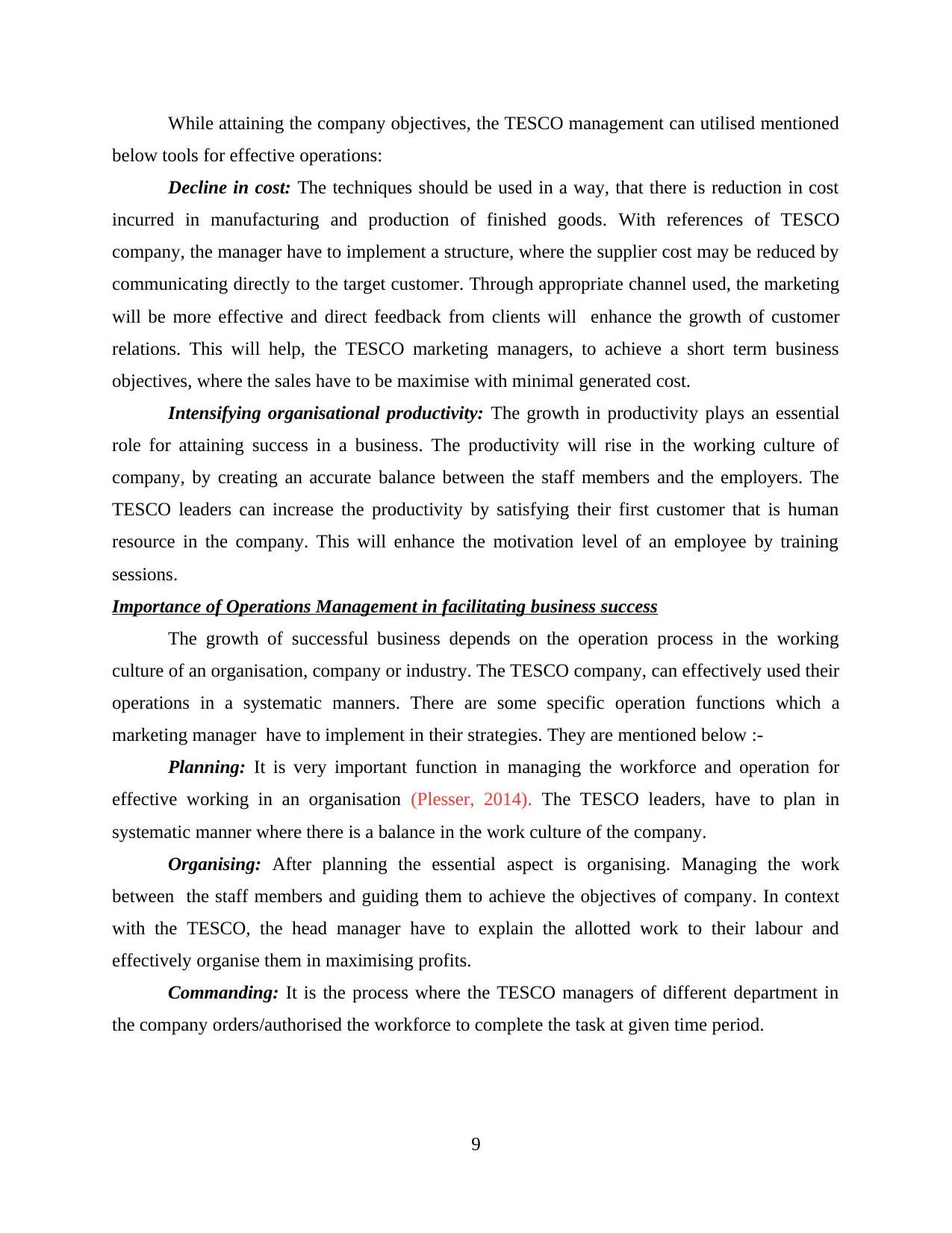
While attaining the company objectives, the TESCO management can utilised mentioned
below tools for effective operations:
Decline in cost: The techniques should be used in a way, that there is reduction in cost
incurred in manufacturing and production of finished goods. With references of TESCO
company, the manager have to implement a structure, where the supplier cost may be reduced by
communicating directly to the target customer. Through appropriate channel used, the marketing
will be more effective and direct feedback from clients will enhance the growth of customer
relations. This will help, the TESCO marketing managers, to achieve a short term business
objectives, where the sales have to be maximise with minimal generated cost.
Intensifying organisational productivity: The growth in productivity plays an essential
role for attaining success in a business. The productivity will rise in the working culture of
company, by creating an accurate balance between the staff members and the employers. The
TESCO leaders can increase the productivity by satisfying their first customer that is human
resource in the company. This will enhance the motivation level of an employee by training
sessions.
Importance of Operations Management in facilitating business success
The growth of successful business depends on the operation process in the working
culture of an organisation, company or industry. The TESCO company, can effectively used their
operations in a systematic manners. There are some specific operation functions which a
marketing manager have to implement in their strategies. They are mentioned below :-
Planning: It is very important function in managing the workforce and operation for
effective working in an organisation (Plesser, 2014). The TESCO leaders, have to plan in
systematic manner where there is a balance in the work culture of the company.
Organising: After planning the essential aspect is organising. Managing the work
between the staff members and guiding them to achieve the objectives of company. In context
with the TESCO, the head manager have to explain the allotted work to their labour and
effectively organise them in maximising profits.
Commanding: It is the process where the TESCO managers of different department in
the company orders/authorised the workforce to complete the task at given time period.
9
below tools for effective operations:
Decline in cost: The techniques should be used in a way, that there is reduction in cost
incurred in manufacturing and production of finished goods. With references of TESCO
company, the manager have to implement a structure, where the supplier cost may be reduced by
communicating directly to the target customer. Through appropriate channel used, the marketing
will be more effective and direct feedback from clients will enhance the growth of customer
relations. This will help, the TESCO marketing managers, to achieve a short term business
objectives, where the sales have to be maximise with minimal generated cost.
Intensifying organisational productivity: The growth in productivity plays an essential
role for attaining success in a business. The productivity will rise in the working culture of
company, by creating an accurate balance between the staff members and the employers. The
TESCO leaders can increase the productivity by satisfying their first customer that is human
resource in the company. This will enhance the motivation level of an employee by training
sessions.
Importance of Operations Management in facilitating business success
The growth of successful business depends on the operation process in the working
culture of an organisation, company or industry. The TESCO company, can effectively used their
operations in a systematic manners. There are some specific operation functions which a
marketing manager have to implement in their strategies. They are mentioned below :-
Planning: It is very important function in managing the workforce and operation for
effective working in an organisation (Plesser, 2014). The TESCO leaders, have to plan in
systematic manner where there is a balance in the work culture of the company.
Organising: After planning the essential aspect is organising. Managing the work
between the staff members and guiding them to achieve the objectives of company. In context
with the TESCO, the head manager have to explain the allotted work to their labour and
effectively organise them in maximising profits.
Commanding: It is the process where the TESCO managers of different department in
the company orders/authorised the workforce to complete the task at given time period.
9
⊘ This is a preview!⊘
Do you want full access?
Subscribe today to unlock all pages.

Trusted by 1+ million students worldwide
1 out of 16
Related Documents
Your All-in-One AI-Powered Toolkit for Academic Success.
+13062052269
info@desklib.com
Available 24*7 on WhatsApp / Email
![[object Object]](/_next/static/media/star-bottom.7253800d.svg)
Unlock your academic potential
Copyright © 2020–2025 A2Z Services. All Rights Reserved. Developed and managed by ZUCOL.





